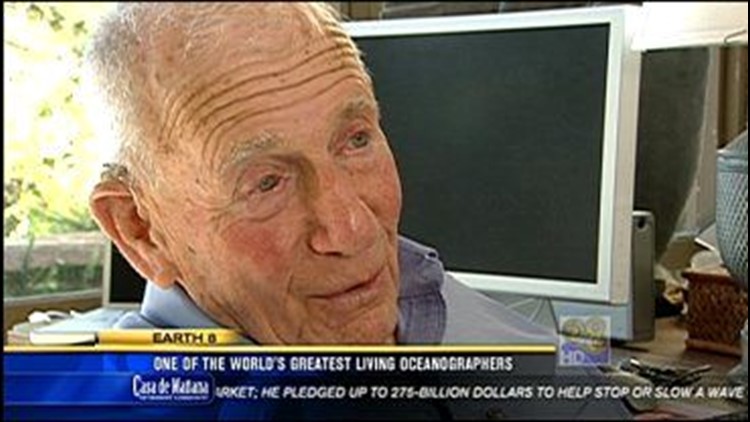His science helped our military make safe amphibious landings during World War II. He's in the ranks with Thomas Edison as far as great inventors are concerned. Even today, we benefit from his studies and research in wave motion, and his curiosity about physical science is just as strong today as it was nearly 70 years ago.
If there was a king of rock in oceanography, this man would get the crown. His achievements and medals are extensive. The Navy has honored him, in addition to various scientific organizations worldwide. Munk has made tremendous discoveries in physical oceanography. One of his most well-known accomplishments: surf forecasting.
"Wave prediction is something new and I was very much involved. It was the beginning of my career because during World War II I was involved in predicting landing conditions for amphibious landings," he said.
It was a critical time in history when Munk and past director of Scripps, Harold Sverdrup, utilized their method of forecasting surf, known as the Sverdrup/Munk Theory.
"When it came to the Normandy landing, they used the method that I had worked on. They used the British work but there were some very high ranking meteorological offices that did the prediction. I wish we could have been involved, but we were not directly involved," Munk said.
Wave forecasting called for the delay of the Normandy landing. Munk reveals intimate details of that day - something you may not find in history books.
"The Normandy landing is famous because weather conditions were very poor and you may not realize it was postponed by General Eisenhower for 24 hours because of the prevailing wave conditions. And then he did decide, in spite of the fact that conditions were not favorable, it would be better to go in than lose the surprise element, which would have been lost if they waited for the next tidal cycle two weeks," Munk said.
Munk has not stopped working since beginning his career at Scrippps nearly 70 years ago. He continues to be involved in groundbreaking projects at Scripps and around the world. At 91, he's as energetic as ever.
"I have not retired. I am 91. I should go to sleep somewhere I guess, but I enjoy working on problems, so I am given the chance to do so," he said.
When asked about the future of our climate, Munk says more research is needed in rising ocean temperatures.
"I am very concerned that not much is being done about the heating of the oceans," he said.
It's a subject he started investigating long before global warming became a household phrase.
"Two-thirds of the heat that's been added in the last 50 years has gone into the ocean, and only one-thirds in the atmosphere. If there wasn't available ocean on this planet for heat storage, the warming of the atmosphere would have been three times as big," Munk said.



